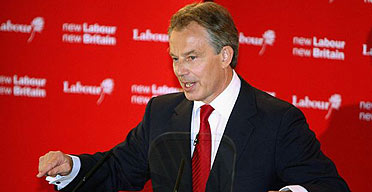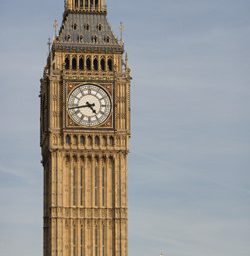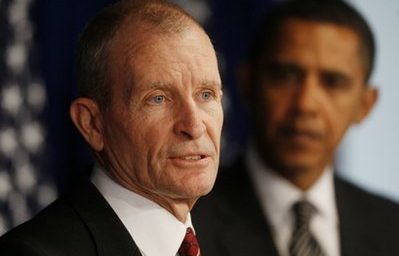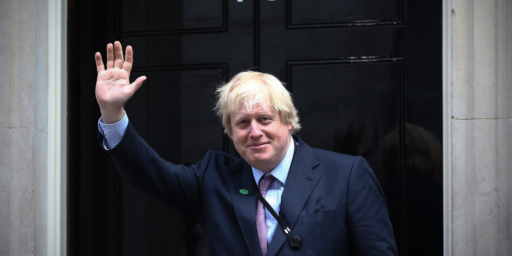Tony Blair Leaving Office June 27
 British Prime Minister Tony Blair is stepping down first as Labour Party leader and then as premier.
British Prime Minister Tony Blair is stepping down first as Labour Party leader and then as premier.
After eleven years, few of his countrymen are sad to see him go. Then again, that was the case for Winston Churchill and Margaret Thatcher, too. Leaders simply wear out their welcome after long stints in office. That’s been the case with every two term American president since FDR. Perhaps it’s inevitable in the media age, especially with the advent of 24/7 instantaneous commentary.
Matthew Tempest, The Guardian:
In an emotional 17-minute speech, he said the judgment on his 10-year administration was “for you, the people, to make”. Mr Blair paid special tribute to his wife and children “who never let me forget my failings”.
But he concluded: “Hand on heart, I did what I thought was right. I may have been wrong – that’s your call. But I did what I thought was right for our country. This country is a blessed country. The British are special. The world knows it, we know it, this is the greatest country on earth.”
He dealt directly with Iraq, many people’s perception as his ultimate legacy, saying: “The blowback since … has been fierce, unrelenting and costly.” But he insisted: “The terrorists will never give up if we give up.”
Mr Blair admitted that in May 1997, when Labour took over after 18 years of Tory rule, “expectations were too high.” But he added: “I would not want it any other way. I was, and remain, an optimist.”
Pointing to Africa, climate change and globalisation, he declared Britain had changed under his 10-year leadership, saying: “Britain is not a follower, Britain is a leader.”
He made no reference as to whether he would stay on as backbench MP for Sedgefield.
Mr Blair acknowledged he had been accused of “messianic zeal”, but said as prime minister, over issues such as Sierra Leone, Kosovo and then Afghanistan and Iraq, you were “alone with your instinct”.
Quite so.
The meeting ended with the entire cabinet “thumping” the table in appreciation, according to Mr Blair’s official spokesman.
While Mr Blair flew to the north-east, the likely next prime minister was in the Commons, answering Treasury questions. “There are, of course, 600,000 vacancies in the economy – there’s one more today actually as a result of announcements that have just been made,” Mr Brown quipped to laughter from all sides.
Blair has at least one remaining admirer:
Former US secretary of state Colin Powell said Mr Blair had “an enormous impact on world politics, and he certainly has had an enormous impact on the special relationship between the United States and Great Britain. “He has been a friend, he has been steadfast in the face of negative public opinion, and in the face of crises he’s stood steady. And we could always count on him.”
Indeed.
Brian Wheeler, Political reporter, BBC News has a retrospective:
The story of his rise to power is certainly not a rags to riches tale – he was born with every advantage in life – but it is no less remarkable for that.
It is the story of how a middle class, privately-educated barrister – the son of a would-be Tory MP – went on to become the most successful leader in the history of the Labour Party, profoundly changing it and the country in the process.
And how a man once seen as a lightweight – preoccupied with his own image and popularity – became one of the most powerful and controversial figures on the world stage.
Patrick Wintour, Political Editor, The Guardian
Tony Blair will today return to Durham’s Trimdon Labour Club, and the room where he launched his Labour leadership campaign on June 11 1994, to announce that he is standing down as party leader, before finally endorsing Gordon Brown as his successor tomorrow.
Mr Blair wants to bring down the curtain on his time in high office in the place where he began his fight to succeed John Smith and create the New Labour electoral success story.
He will inform the cabinet this morning before flying to his Sedgefield constituency to announce his decision at noon amid the party workers who first selected him as their parliamentary candidate on May 20 1983 at the age of 30. He is expected to make a personal speech that will insist he is a product of Labour and that his government has left Britain stronger than he found it.
Philip Webster, Political Editor, The Times:
David Cameron mocked Mr Blair’s administration yesterday as a “government of the living dead” after a spate of reports this week suggesting that Mr Brown would axe a number of ministers. He claimed there would be “another seven weeks of paralysis” but Mr Blair told him not to be too “cocky” about last week’s local election results, and said that he would be concentrating on policies on education, health and law and order. Downing Street pointed out that the next few weeks would keep Mr Blair and other ministers well occupied. There will be two new policy statements from No 10 on the role of the state and families. The prospectuses for a new wave of city academies will be introd-duced, as will White Papers on streamlining the planning process and energy security.
Tim Worstall of the eponymous blog invokes Monty Python.
RedState‘s Paul Cella:
I am conflicted on the subject of Tony Blair. There are good reasons to dislike him intensely. He has, for instance, presided over the abolition of Britain’s liberty. There has been no more reliable advocate of Liberalism, or more feckless and even perverse skeptic of multiculturalism, than Tony Blair.
On the other hand, his loyalty and eloquence as an ally has been unfailing; and shone most brightly when America was in her hour of need. This is no small thing. Nor should it be forgotten that he disarmed Socialism in Great Britain, and allowed the British people to prosper — at least materially.
Iain Dale of Iain Dale’s Diary: “I have to pinch myself that I am listening to this rubbish. This speech demeans Blair. His constant craving for approval is stomach churning.”
Steve Clemons, The Washington Note: “Blair used to seem a lot like Clinton. Now sadly, he looks a lot like Bush.”





